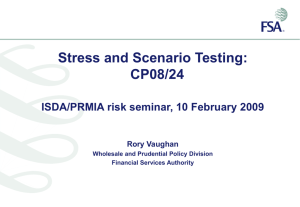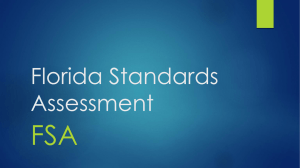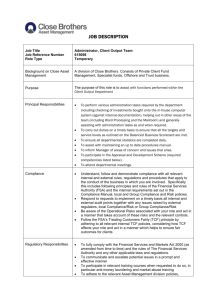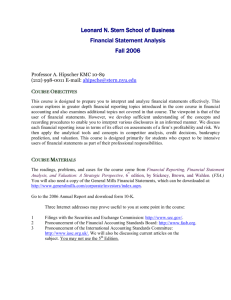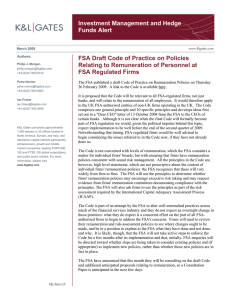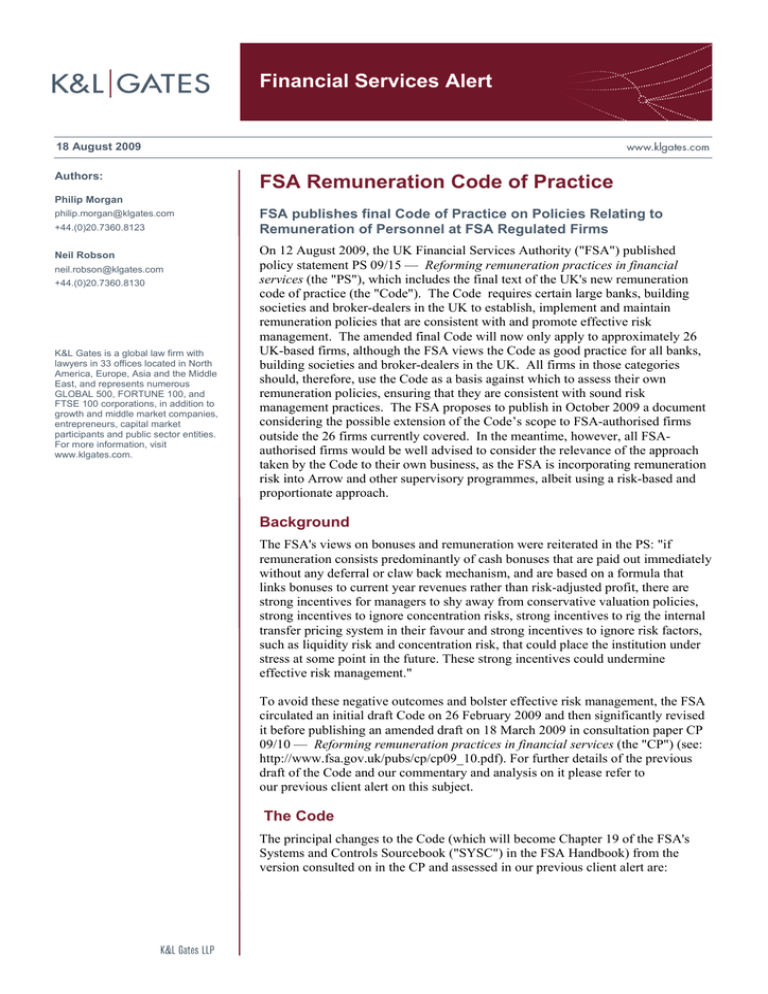
Financial Services Alert
18 August 2009
Authors:
FSA Remuneration Code of Practice
Philip Morgan
philip.morgan@klgates.com
+44.(0)20.7360.8123
Neil Robson
neil.robson@klgates.com
+44.(0)20.7360.8130
K&L Gates is a global law firm with
lawyers in 33 offices located in North
America, Europe, Asia and the Middle
East, and represents numerous
GLOBAL 500, FORTUNE 100, and
FTSE 100 corporations, in addition to
growth and middle market companies,
entrepreneurs, capital market
participants and public sector entities.
For more information, visit
www.klgates.com.
FSA publishes final Code of Practice on Policies Relating to
Remuneration of Personnel at FSA Regulated Firms
On 12 August 2009, the UK Financial Services Authority ("FSA") published
policy statement PS 09/15 — Reforming remuneration practices in financial
services (the "PS"), which includes the final text of the UK's new remuneration
code of practice (the "Code"). The Code requires certain large banks, building
societies and broker-dealers in the UK to establish, implement and maintain
remuneration policies that are consistent with and promote effective risk
management. The amended final Code will now only apply to approximately 26
UK-based firms, although the FSA views the Code as good practice for all banks,
building societies and broker-dealers in the UK. All firms in those categories
should, therefore, use the Code as a basis against which to assess their own
remuneration policies, ensuring that they are consistent with sound risk
management practices. The FSA proposes to publish in October 2009 a document
considering the possible extension of the Code’s scope to FSA-authorised firms
outside the 26 firms currently covered. In the meantime, however, all FSAauthorised firms would be well advised to consider the relevance of the approach
taken by the Code to their own business, as the FSA is incorporating remuneration
risk into Arrow and other supervisory programmes, albeit using a risk-based and
proportionate approach.
Background
The FSA's views on bonuses and remuneration were reiterated in the PS: "if
remuneration consists predominantly of cash bonuses that are paid out immediately
without any deferral or claw back mechanism, and are based on a formula that
links bonuses to current year revenues rather than risk-adjusted profit, there are
strong incentives for managers to shy away from conservative valuation policies,
strong incentives to ignore concentration risks, strong incentives to rig the internal
transfer pricing system in their favour and strong incentives to ignore risk factors,
such as liquidity risk and concentration risk, that could place the institution under
stress at some point in the future. These strong incentives could undermine
effective risk management."
To avoid these negative outcomes and bolster effective risk management, the FSA
circulated an initial draft Code on 26 February 2009 and then significantly revised
it before publishing an amended draft on 18 March 2009 in consultation paper CP
09/10 — Reforming remuneration practices in financial services (the "CP") (see:
http://www.fsa.gov.uk/pubs/cp/cp09_10.pdf). For further details of the previous
draft of the Code and our commentary and analysis on it please refer to
our previous client alert on this subject.
The Code
The principal changes to the Code (which will become Chapter 19 of the FSA's
Systems and Controls Sourcebook ("SYSC") in the FSA Handbook) from the
version consulted on in the CP and assessed in our previous client alert are:
Financial Services Alert
•
The implementation date of the Code is now
1 January 2010 rather than 6 November 2009
(please see below for further details on the
timetable).
•
The scope of application has been narrowed
down so that now only approximately 26
large banks, building societies and brokerdealers will be subject to the Code, rather
than the 47 firms that the CP estimated would
be required to comply with the Code. SYSC
19.1 states that the Code only applies to firms
that meet one or more of the following
conditions:
a.
the firm is a UK bank or building society
that had capital resources exceeding £1
billion on its last accounting reference
date
b. the firm is a BIPRU 730k firm (i.e., an
FSA authorised investment firm with the
highest base capital requirement for
regulatory capital) that had capital
resources exceeding £750 million on its
last accounting reference date; or
c.
the firm is:
I. a full credit institution, a BIPRU
730k firm or a third country
BIPRU 730k firm;
II. the firm is part of a group; and
III. on the firm's last accounting
reference date total capital
resources held within the group:
A. by UK banks or building
societies exceeded £1 billion; or
B. by BIPRU 730k firms exceeded
£750 million.
However, it should be noted that the Code
expressly does not apply to UK branches of EEA
firms.
•
Three of the principles concerning
remuneration structuring (principles 8, 9 and
10), which had previously been stated to be
evidential provisions,* were deemed to be
overly prescriptive, especially with regard to
more junior employees, and these principles
have now been recast as guidance under a
very general new principle 8, which requires
only that remuneration structures be
consistent with, and promote, effective
risk management.
•
In addition, new principle 8 applies only to
employees who perform significant
influence functions (including directors,
senior managers of significant business units
and most proprietary traders) and any other
employees whose activities could have a
significant impact on the firm's risk profile.
•
Principle 8 contains an important new
paragraph of guidance indicating that
guaranteed bonuses (and similar payments in
addition to an employee’s salary) that run for
a period of more that one year and that are
not based on performance during the
performance period under review are likely
to be inconsistent with principle 8.
•
Further new guidance to new principle 8
clarifies that the Code need not prevent a
firm from paying a bonus to employees in a
loss-making part of the business if the bonus
is justified on other grounds, for example
incentivising employees involved in new
business ventures that could be loss-making
in their early stages.
*An evidential provision is an FSA
Handbook provision that has evidential
value in showing that a binding rule (in this
case, the Code’s general requirement in
SYSC 19.2.1) has been breached or
complied with. As the FSA notes in the PS,
evidential provisions are not per se
compulsory; it remains open for a firm to
attempt to demonstrate that it complies with
the general requirement, even if it does not
or cannot comply with an evidential
provision. The supporting non-binding
guidance provides the FSA's further
thoughts as to how it believes firms should
interpret each evidential provision.
Timing
The key steps for the implementation of the
Code and its associated regulatory framework
are:
• By the end of August 2009, the FSA
will send letters to firms’ remuneration
committees asking them to complete a
remuneration policy statement and
providing further details as to what they
should include in the statement.
•
Firms must return their remuneration
policy statements to the FSA by the end
of October 2009.
18 August 2009
2
Financial Services Alert
•
The FSA will hold meetings with
remuneration committees and HR/risk
function staff.
•
The Code will come into force for firms
within its scope on 1 January 2010.
•
The transitional arrangements for firms
required to amend employment contracts
that may be amended by the firm end on
31 March 2010.
•
Transitional arrangements for firms
required to amend or terminate other
employment contracts will end on 31
December 2010.
the end of October. This will enable the FSA to
check compliance with the Code. Non-compliant
firms could face enforcement action or
ultimately, be forced to hold additional capital
should they pursue risky processes.
The FSA has said that it will keep the Code
under close review to assess its effectiveness and
will take account of future market developments
and progress on international implementation.
The FSA has also indicated that it plans, if it is
appropriate, to amend the Code in line with an
international approach, once one has been
agreed. The FSA will publish a follow-up
statement on the implementation and
effectiveness of the Code during the third quarter
of 2010.
Review and Follow-up
Firms to which the Code applies must provide the
FSA with their remuneration policy statement
(signed off by their remuneration committees) by
Anchorage Austin Beijing Berlin Boston Charlotte Chicago Dallas Dubai Fort Worth Frankfurt Harrisburg Hong Kong London
Los Angeles Miami Newark New York Orange County Palo Alto Paris Pittsburgh Portland Raleigh Research Triangle Park
San Diego San Francisco Seattle Shanghai Singapore Spokane/Coeur d’Alene Taipei Washington, D.C.
K&L Gates is a global law firm with lawyers in 33 offices located in North America, Europe, Asia and the Middle East, and represents
numerous GLOBAL 500, FORTUNE 100, and FTSE 100 corporations, in addition to growth and middle market companies, entrepreneurs,
capital market participants and public sector entities. For more information, visit www.klgates.com.
K&L Gates comprises multiple affiliated partnerships: a limited liability partnership with the full name K&L Gates LLP qualified in Delaware and
maintaining offices throughout the U.S., in Berlin and Frankfurt, Germany, in Beijing (K&L Gates LLP Beijing Representative Office), in Dubai,
U.A.E., in Shanghai (K&L Gates LLP Shanghai Representative Office), and in Singapore (K&L Gates LLP Singapore Representative Office); a
limited liability partnership (also named K&L Gates LLP) incorporated in England and maintaining offices in London and Paris; a Taiwan
general partnership (K&L Gates) maintaining an office in Taipei; and a Hong Kong general partnership (K&L Gates, Solicitors) maintaining an
office in Hong Kong. K&L Gates maintains appropriate registrations in the jurisdictions in which its offices are located. A list of the partners in
each entity is available for inspection at any K&L Gates office.
This publication is for informational purposes and does not contain or convey legal advice. The information herein should not be used or relied
upon in regard to any particular facts or circumstances without first consulting a lawyer.
©2009 K&L Gates LLP. All Rights Reserved.
18 August 2009
3

